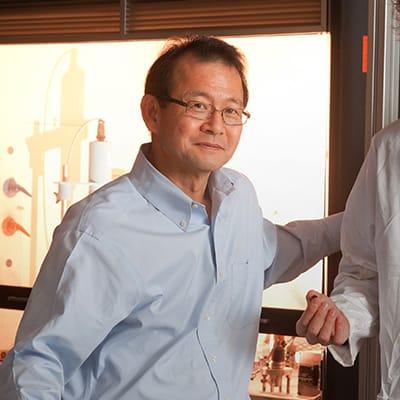Faculty and students in the MIT Department of Mechanical Engineering (MechE) innovate, create, and study the world’s next technology challenges. Mechanical engineering is a broad and versatile engineering disciplines, and LGOs in the department have multiple focused areas to choose. From genetic engineering tools to cheetahs, the makers at MechE continue to produce amazing things.
LGO students completing the MS in Mechanical Engineering complete:
- The required courses in the LGO summer core
- Three Mechanical Engineering courses
- One additional engineering course as approved by department
- LGO Internship incorporating Mechanical Engineering and management content, resulting in a dual-degree thesis overseen by the student’s faculty advisor
Mechanical Engineering (Course 2) is organized into seven research areas that students can pursue:
- Mechanics
- Design, Manufacturing, and Product Development
- Controls, Instrumentation and Robotics
- Energy Science and Engineering
- Ocean Science and Engineering
- Bioengineering
- Micro and Nanotechnology
A full list of Course 2 classes can be found on the MIT Course Catalogue.
Popular research areas among LGOs:
Design, Manufacturing, and Product Development
The Design area of Mechanical Engineering is popular among our students. Courses in design and manufacturing help prepare students for leadership positions in manufacturing and product management and development across industries.
- Key Areas of Research: Precision and machine design; product design and development; environment and sustainability; information and sensing; manufacturing process; systems
- Sample of Classes: 2.744 Product Design; 2.168 Learning Machines; 2.734 Engineering Systems Development; 2.75 Medical Device Design; 2.76 Global Engineering; 2.810 Manufacturing Processes and Systems.
Controls, Instrumentation and Robotics
Robots and automated processes are transforming global operations across industries. MechE’s CIR focuses on core competencies in dynamic systems and controls, augmented by a range of related topics such as mechanical design, manufacturing, electronics, materials, and biology.
- Key Areas of Research: Novel actuator and sensor technology; biorobotics and bioinstrumentation; control of complex systems; precision instrumentation; autonomous robotic vehicle; optics
- Sample of Classes: 2.096 Intro to Numerical Simulation; 2.120 Introduction to Robotics; 2.131 Adv Instrumentation & Measurement; 2.140 Analysis & Design Feedback Control; 2.710 Optics; 2.740 Bio-inspired Robotics.
Energy Science and Engineering
Students interested in industrial renewable energies and alternative energy sources focus in this area. MechE’s Energy area focuses on technologies for efficient and clean energy conversion and utilization to meet the challenge of rising energy demands and prices, while also addressing environmental impact.
- Key Areas of Research: Engines, transportation, combustion, and control; solar energy and photovoltaics; transport phenomena and water desalination; carbon dioxide capture and hydrogen research; electrochemical energy storage and conversion; and energy conservation.
- Sample of Classes: 2.55 Advanced Heat & Mass Transfer; 2.61 Internal Combustion Engines; 2.62 Fund of Adv Energy Conversion; 2.625 Electrochemical Energy Storage; 2.65 Sustainable Energy; 2.83 Energy, Materials & Mfg.
Bioengineering
This track focuses on biomechanics and designing/refining medical devices, and has been useful for students interested in working in the medical device, biotech, and healthcare industries after LGO.
- Key Areas of Research: Bioimaging and bioinformatics; bioinstrumentation and design; biomaterials and tissue engineering; and biomechanics.
- Sample of Classes: 2.18 Biomolecular Feedback Systems; 2.250 Fluid Dynamics and Disease; 2.37 Fundamentals Nanoengineering; 2.673J Instrumentation and Measurement for Biological Systems; 2.785J Cell-Matrix Mechanics; 2.796 Quantitative Physiology: Organ Transport Systems
Mechanical Engineering is currently LGO students’ most popular engineering department, and many of partner companies offer internships fulfilling MechE’s requirements.
Recent Mechanical Engineering internships were:
Allison Smedberg (LGO ’23)
Title: From Bench to Bucks: An Approach and Case Study in Scaling Additive Research and Development Technologies within the Aerospace Industry
Partner Company: American Industrial Partners
Mariam Ibrahim (LGO ’23)
Title: Developing a Data-driven Strategy for In-Process Quality Assurance for Additive Manufacturing
Partner Company: Stryker
Kyle Lux (LGO ’23)
Title: Identifying Bottlenecks through Process Consistency in High-Capacity Automated Manufacturing
Partner Company: Nissan
Zoe Hinton (LGO ’23)
Title: Enhanced Digital Capability through the use of Simulation in Footwear Product Creation
Partner Company: Nike
Gustavo Castillo (LGO ’22)
Title: Aggregation and Control of Bidirectional Chargers in a Residential V2G Application
Partner Company: NextEra Energy
Trevor Thompson (LGO ’21)
Title: Modeling Air Source Heat Pump Adoption Propensity and Simulating the Distribution Level Effects of Large-Scale Adoption
Partner Company: National Grid
For LGO applicants, the Mechanical Engineering department looks for:
- A previous degree in science or engineering with a strong academic record. Previous LGO mechanical engineering students have enrolled with degrees in geosciences, aerospace engineering, chemical engineering, civil engineering, industrial engineering, chemistry, physics, and systems engineering.
- At least one previous course in each following subjects:
The department requires proof that the student is ready for graduate-level coursework in MechE. Applicants who did not major in Mechanical Engineering in their undergraduate studies are encouraged to show in the application where/what classes meet the above prerequisites.
Some LGO students have taken all of these classes during their undergraduate study. Some, however, have completed the above coursework by enrolling part-time in a local university and completing the missing courses before they start at MIT.
Applicants should have a stated interest in Mechanical Engineering. They do not need to officially declare a track when applying, but the department would like to know what academic and professional interests have led the student to choose the MechE department. Work experience is very helpful, but successful applicants do not necessarily have to come from an engineering or manufacturing role. In the past, LGO has accepted students from the oil and gas, consulting, consumer goods, defense, nonprofit, industrial chemical, and finance industries.







